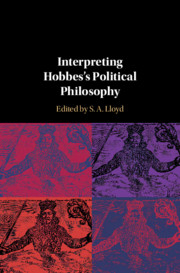 Cambridge University Press has just published my chapter on the need to interpret Thomas Hobbes historically and philosophically, in an important new book edited by Sharon Lloyd. I contrast two prominent interpreters of Hobbes: Jean Hampton, a philosopher, and Quentin Skinner, a historian. I show, surprisingly, that Skinner actually uses philosophical analysis better than Hampton to recover what Hobbes thought.
Cambridge University Press has just published my chapter on the need to interpret Thomas Hobbes historically and philosophically, in an important new book edited by Sharon Lloyd. I contrast two prominent interpreters of Hobbes: Jean Hampton, a philosopher, and Quentin Skinner, a historian. I show, surprisingly, that Skinner actually uses philosophical analysis better than Hampton to recover what Hobbes thought.
In short, both historical and philosophical analysis are needed. Yet the methodological literature in history of political thought (and history of philosophy) typically sees history and philosophy as essentially separate.
Unfortunately, the publishers managed to mangle my point by changing the title of my chapter at the last minute, without my permission. The title had been:
Methodologies of Interpreting Hobbes: Historical and Philosophical
But someone at Cambridge University Press unilaterally decided to change the italics:
Methodologies of Interpreting Hobbes: Historical and Philosophical
This makes it sound as if there are two methodologies for interpreting Hobbes, when I was arguing that there is one, which should combine historical and philosophical thinking.
I complained two months ago but nothing has yet happened. It’s too late to change the printed book, but I’ve asked for the website and PDF to be corrected.
2 Comments